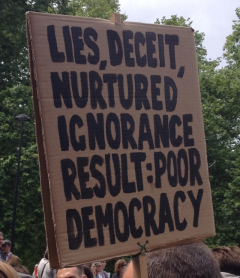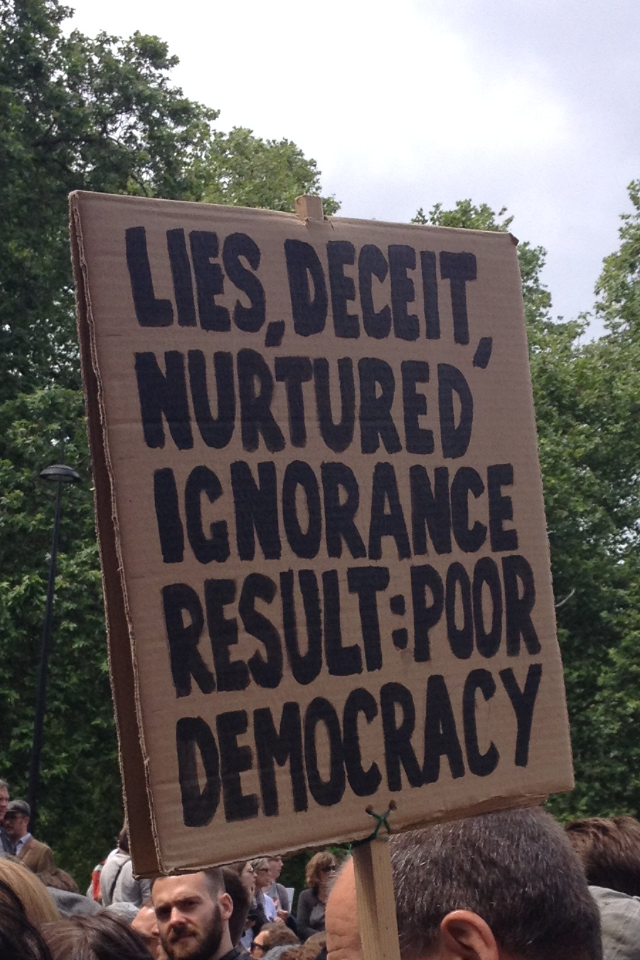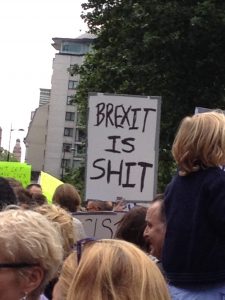Dear Ian
Clare has asked me to write to you. I understand that over lunch you were discussing Brexit . I hate to use that word. I feel it diminishes the significance of a 44 year old relationship breakdown as much as “Brexiteer” gives its proponents an inappropriately gallant and brave aura. There is no d’Artagnan to be found here. She said that we took a similar view of the referendum result but that you were resigned to acceptance of “it” because you viewed yourself as a democrat.
Your view is one I respect; however, it seems that we presently have differing opinions as to our respective best responses to the “result”. She invited me to write to you and I thank you for affording me an opportunity to do so. Your opinions are well-respected by her and she is a good judge. I hope that you do not mind me responding in this forum because the response might have a wider application. I, too, believe that I am a respecter of democracy, as much as we can know it, and in so far as we can define it.
A survey carried out by Ipsos Public Affairs in October 2016 asked voters which issues they attached most importance to when voting in June 2016. Some 74% of those who voted to leave the EU attached “very important weight” to the ability of the UK to “make its own laws”.¹·¹ So, it is reasonable to suggest that 3 out of 4 of the 17.41 million who voted to leave did so believing that the issue of “sovereignty” was of the most fundamental importance. The total electorate was 46.5 million. I postulate that 13 million people evidently believed that the nation had lost parliamentary sovereignty, those very voters attaching the greatest significance to that issue when determining the recipient of their votes. More so even than immigration and the effect of the same on the UK economy, the second and third issues by the same weighting.
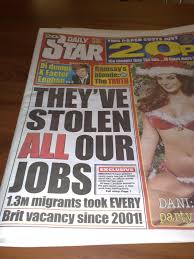 But I shall return to them.
But I shall return to them.
On 2nd February 2017 the Government published a White policy Paper entitled “The United Kingdom’s exit from, and new partnership with, the European Union”. Section 2 deals with the overwhelmingly important issue of sovereignty (for those who considered that they may have wanted to leave the European Union). The admission is unequivocal:-
“The sovereignty of Parliament is a fundamental principle of the UK constitution. Whilst Parliament has remained sovereign throughout our membership of the EU, it has not always felt like that.”
I think that the appropriate response to this admission is to look then at why it has not always felt that Parliament had, after all, retained its sovereignty.
For decades I have protested about the misinformation generated by significant sections of the UK media. Indeed the European Commission in the 1990’s set up a special “myth-debunking” unit to deal with the emerging nonsense¹·². You will find an Economist link below to bendy bananas and the other mischief that has occupied the media’s irresponsible attentions.
I recently spoke with a retired lady and mentioned that I had bought some bleach at a hardware shop. Her husband suggested that shortly I would no longer be able to walk around a shopping centre with a bottle of bleach.
“Because of more EU Regulations…” she guessed.
Of course, as her husband pointed out, the reason is that anti-chemical attack legislation is being planned; domestically, I should add.
Supposedly thoughtful and experienced “leaver” views have focused upon the “Common Market” that Britain joined in 1973 and ratified by way of a first EU referendum in 1975. Indeed, rather more convincingly than the second one in 2016. This is the idea which some people advance (with subtle media encouragement) that we were joining a free market and nothing more. In December 1972 the then Prime Minister Edward Heath published in The Illustrated London News in the following terms:-
“The Community which we are joining is far more than a common market. It is a community in the true sense of that term.”
Heath then went further in his understanding.
“It (the European Community) is far more than a common market…
…it is concerned not only with the establishment of free trade, economic and monetary union
…but…with social issues which affect us all – environmental questions
…working conditions in industry
…consumer protection
…aid to development areas
…maintaining good relations between the industrialized countries which is vital for the prosperity of the whole world.”
My decades of protest at this gross manipulative bias have met a brick-wall of general casual acceptance. Even worse, a casual acceptance actively preyed upon by some of the very representatives who were meant to epitomise the parliamentary sovereignty so revered by those who voted to leave the European Union.
“Dear Marc” wrote my MP on 18th February 2016, “…outside of the EU, we would be able to make the laws in the UK Parliament that work in our national interest, and stop sending £350 million a week to Brussels…”.
That sounds like restoration of “never-lost” sovereignty and how much do we send again?
I once read a play by the Swiss playwright, Max Frisch, named Biedermann und die Brandstifter. The play premiered in 1958 and its English title was The Fire Raisers. In essence, the character Biedermann is conned by an affable stranger and allows the stranger into his attic at a time when reports of arson are rife. He is then further duped and lets another stranger in. The warning signs are obvious to all apart from Biedermann and his wife. The attic becomes a stockpile of inflammable material and Biedermann then watches as his house is burned down by virtue of his unwillingness to deal with the lodgers and resignation that he had to share the house with them.
In our present predicament the house is not just existing bricks and mortar. There are children in it. 39.9% of those who voted aged 55 or over voted to remain in the European Union. 68.5% of those aged 18-34 are believed to have done so.¹·³
The wilful peddling and casual acceptance of lies is also undergoing something of a metamorphosis. The fodder for the naïve is being replaced by something rather more sinister.
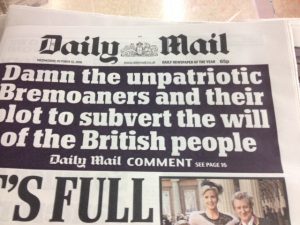
“Remainer Universities” staffed by academics subjected to scrutiny by a Member of Parliament as to their political views, with impunity; High Court judges publicly vilified and called “Enemies of the People”.
I return to immigration, the stuff of Daily Mail and Express hyperbole for decades. “Waves of migrants” stealing jobs so gleefully exploited by UKIP in their distasteful poster campaign showing migrants fleeing conflict. If the National Socialists were still with us they may have had a breach of copyright claim.
The deliberate attempts to merge the concepts of refugee status with economic migration. The blatant falsehood surrounding Turkey’s accession to the European Union. The roadside billboards:-
Turkey (population 76 million) is joining the EU. Vote Leave.
The reality, of course, failed to interest the rabid media. Migrant workers were draining the country of resources, claiming benefits and hospital beds while editors foaming at the mouth with mock-indignation were content to allow the lies to become more virulent.
As long ago as 5th November 2013 the Centre for Research and Analysis of Migration (CReAM) at University College London had reported that “UK immigrants who arrived since 2000 are less likely to receive benefits and less likely to live in social housing than UK natives. What’s more, over the decade from 2001 to 2011, they made a considerable positive net contribution to the UK’s fiscal system, and thus helped to relieve the fiscal burden on UK-born workers”.²·¹
The Prime Minister was also complicit to an extent because as Home Secretary she clearly had possessed the powers conferred on her by the European Union²·² to control levels of intra-EU migration so as to restrict the right to remain of those who did not have work after 3 months. The reality, of course, was that:-
i) most intra-EU migrants were working (hard) and contributing taxes, as above; and
ii) there was no inclination whatsoever to implement restrictions at a time of austerity and public spending reduction.
However, she failed to advise and properly inform the populace of the fact that unfettered immigration into the UK simply did not exist.
Potential referendum voters were subjected to demonstrable and fundamental dishonesty at almost every conceivable level on issues which they were likely to have viewed as the most important when considering how to vote.
But what of the referendum itself?
Constitutionally this was an advisory referendum. It is just that nobody wanted to tell the population that is was not binding. Ultimately Parliament is sovereign. The United Kingdom has a parliamentary democracy, ironically so revered by those wanting to leave. But binding the (second) June 2016 referendum was not. Explicitly so.
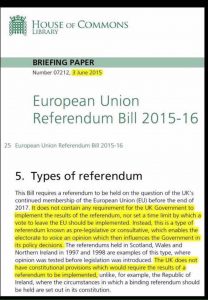 Actually, a consultation paper; nothing more and nothing less. David Cameron did not want to be seen to have been offering something which diminished his “come on then, bring it on” credentials and UKIP kept quiet too because it served their interests to have their supporters believe that it was binding in terms of encouraging voter turn-out.
Actually, a consultation paper; nothing more and nothing less. David Cameron did not want to be seen to have been offering something which diminished his “come on then, bring it on” credentials and UKIP kept quiet too because it served their interests to have their supporters believe that it was binding in terms of encouraging voter turn-out.
Being non-binding may also explain why it was so poorly constituted from a democratic perspective because:-
a) those likely to be most directly affected were disenfranchised, namely:-
i) 16 and 17 year olds who had previously been afforded a vote in the Scottish independence referendum;
ii) those who were now living abroad and had done so for more than 15 years but retained British citizenship; and
iii) EU citizens living here and paying taxes, some for decades but who had not applied for UK citizenship before the referendum; and
b) there was no “supermajority” requirement as is required under most constitutions in situations of major constitutional review (generally a 60/40 or 66/33 requirement to effect change being required). Therefore those wanting to remain were always at a fundamental disadvantage because the status quo is more difficult to promote, such is human nature; and
c) statistically older voters are more likely to vote. Again, that is life but it slews a supposedly democratic process.
In 2016 the population of the UK was 65.6 million, its largest ever, according to the Office for National Statistics. Consequently under 27% of the population voted to leave but this is said to constitute the “Will of the People”.
Marnix Amand in Prospect magazine has considered specifically the Swiss referendum experience (and experienced in such matters they certainly are). This was his verdict²·³:-
“David Cameron drew up a textbook example of a referendum done wrong: asking an ill-informed electorate to choose between a costly and constraining EU marriage full of unsavory compromises and a fantasized Brexit-with-benefits. The utter vagueness of the Leave option allowed their campaign to cast the widest net of all, encouraging each voter to keep their most favorable version of Brexit in mind, however far that may be from the Leave politicians’ intentions.
This was an act of political genius. It allowed hard and soft Brexiteers, free-market fundamentalists and protectionists, open-door internationalist and xenophobes to all joyously add their votes together and stick it to the EU.”
However, the lesson to be learned from Switzerland is clear. On an ill-conceived immigration referendum there in 2014 a subsequent election then gave the government sufficient legitimacy to effectively ignore the result.
Jeremy Paxman said of Cameron on Irish broadcaster RTE’s The Late, Late Show that what he had done was “nigh-on unforgiveable”.
We cannot and must not let our descendants suffer the poor democratic consequences of (as the marcher at a London protest pictured above in July 2016 put it):-
Lies, Deceit, Nurtured Ignorance
The house cannot be allowed to burn down due to the irresponsible actions and dishonesty of the lodgers in the attic. The house must be repossessed. If the fire has started already then it must be extinguished by education and allocation of resources made available to restore the damage. The house is the inheritance and if the price to pay is a somewhat deflating recognition of naïvety and a propensity to fantasise then it must surely be paid. As David Davis himself has said “if a democracy cannot change its mind, it ceases to be a democracy”.
There I shall conclude without even anything other than a passing mention of electoral interference, computer “bots” programmed to target voters by artificial intelligence controlled abroad and the looming EU Tax Avoidance Directive 2019.
I hope that you can think of yourself as being democratic whilst helping to preserve the house. We need good people to do so and we need them quickly. Thank you for your time and attention Ian.
Kind regards
Marc
————————————
Sources:-
¹·¹https://www.ipsos.com/ipsos-mori/en-uk/how-britain-voted-2016-eu-referendum
¹·² https://www.economist.com/blogs/graphicdetail/2016/06/daily-chart-15
¹·³ Source: Survation http://survation.com/
²·¹ University College London CReAM paper http://www.cream-migration.org/
²·² Article 7 of Directive 2004/38/EC
²·³ “Take it from the Swiss: the Brexit referendum wasn’t legitimate” by Marnix Amand / November 9, 2017 https://www.prospectmagazine.co.uk/politics/take-it-from-the-swiss-the-brexit-referendum-wasnt-legitimate
Copyright statement: “fair use” claimed for purposes such as criticism, comment, news reporting, teaching, scholarship, education and research.
